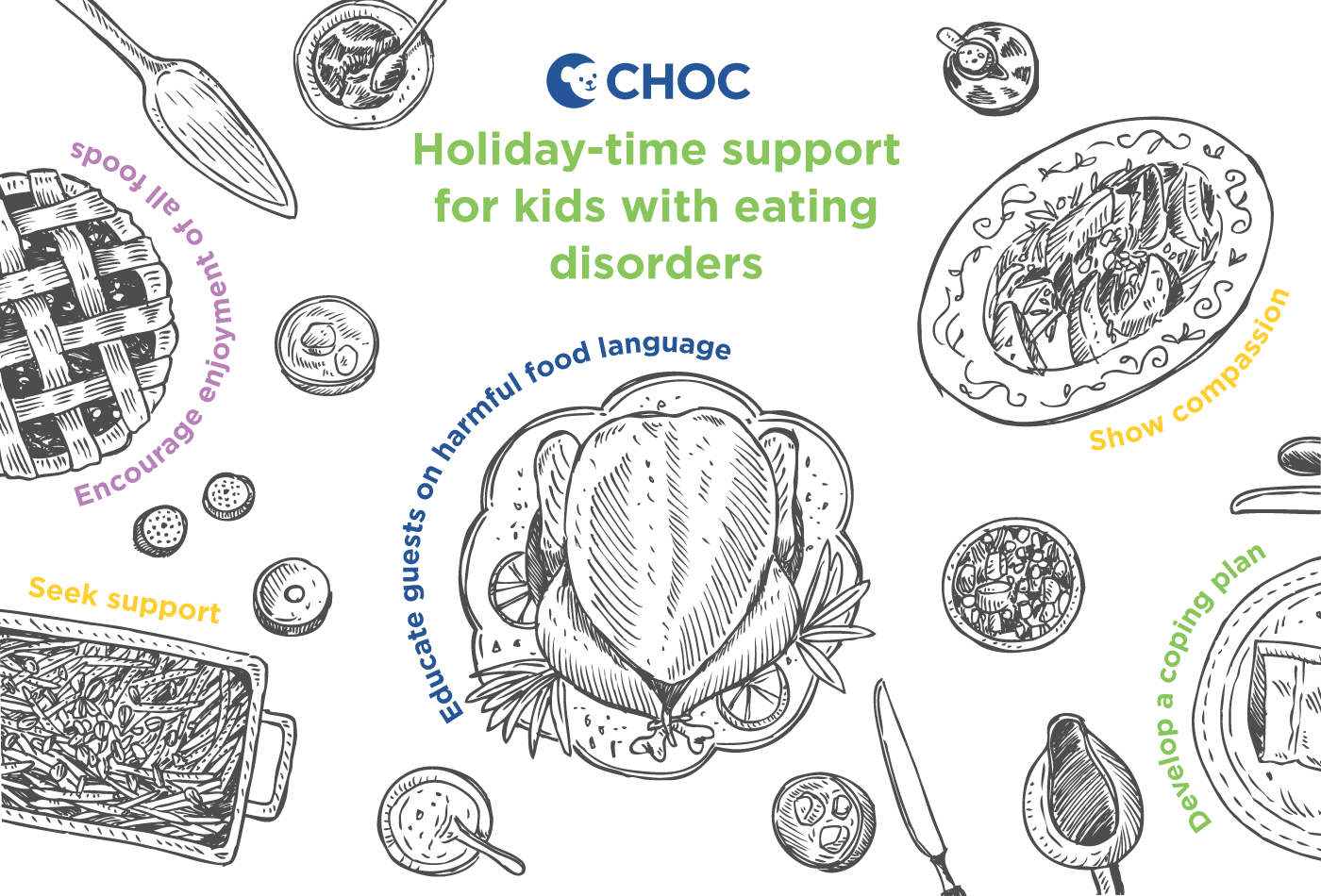For a child or teen diagnosed with an eating disorder, the holiday season may be a time of mixed feelings. They may feel excited to celebrate and spend time with family, while also feeling a variety of emotions related to the holidays’ emphasis on food and eating.
Drs. Sheila Modir and Katelyn Anderson, CHOC pediatric psychologists, help parents understand the difficulties that the holidays may present to children and teens with eating disorders and how to help them navigate the season in a safe and healthy way.
Eating disorders are complex medical and psychiatric disorders that can cause serious health problems for children and teens and, unfortunately, have increased tremendously during the pandemic. The National Eating Disorders Association helpline reported a 40 percent increase in calls from March 2020. Approximately 35 percent of those who called were 13 to 17 years old, which is a 30 percent increase from before the pandemic.
How to help children and teens with eating disorders during the holidays
Drs. Modir and Anderson offer the following tips to parents and caregivers to help their children and teens who may struggle with holiday eating:
- Show compassion: It may be helpful to acknowledge and normalize how difficult the holidays can be.
- Develop a coping plan: Before the holiday event, check in with your child or teen to identify coping skills that they can use to help ground themselves if they feel overwhelmed. Ask them how you can support them.
- Encourage enjoyment of all foods: Make a plan with your child about which foods they will try at the holidays. Encourage enjoyment of all foods by reminding them that there are no “good” or “bad” foods.
- Educate guests on harmful food language: Encourage guests and family members to not discuss diets, weight loss or weight gain. Teach family members about the ways these topics can be harmful to someone struggling with eating. If challenging topics arise, re-direct the conversation or encourage your child to do so by bringing up a positive topic of conversation.
- Seek support: After the holiday event, it’s important that both you and your child seek help to navigate any feelings that may have come up. Sharing your experience with your family, pediatrician or treatment team can also help you reflect on things to prepare for during the next holiday event.

Signs and symptoms of eating disorders
It’s possible that children and teens without diagnosed eating disorders may be triggered by holiday eating. Drs. Modir and Anderson explain common warning signs and symptoms of specific eating disorders below for parents and caregivers to be more aware and seek early intervention if and when necessary.
Anorexia nervosa
- Restricts food leading to significantly low body weight
- Fears weight gain
- Engages in food rituals (i.e., cutting up food into small pieces, taking a long time to complete meals)
- Exercises excessively to “burn off” calories
- Has stomachaches and constipation
- Shows concern with body weight and shape
Bulimia nervosa
- Has recurrent episodes of binge eating
- Demonstrates a lack of control in overeating during these episodes
- Has recurrent inappropriate compensatory behaviors (i.e., laxatives, vomiting)
- Skips meals
- Disappears after consuming a meal
- Exercises excessively
- Shows concern with body weight and shape
Avoidant Restrictive Food Intake Disorder (ARFID)
- Shows significant weight loss and nutritional deficiency
- Eats only certain textures of food
- Fears choking or vomiting
- Lacks appetite or interest in food
- Has a limited range of preferred foods
- Does not have body image concerns or fear of weight gain
What to do if you suspect that your child may have an eating disorder
- Schedule an appointment with your child’s pediatrician and discuss your concerns and the warning signs you are noticing
- Have an open and direct conversation with your child. Express your concerns and let them know you will be there for them
- Provide support to your child as this is a difficult time for the both of you and having a close and caring relationship is important
- Connect with an outpatient therapist who specializes in working with eating disorders. You can also contact the National Eating Disorders Helpline, 800-931-2237, for more immediate support for your child.
Resources for eating disorders:
- The National Eating Disorders Association (NEDA)
- National Association of Anorexia Nervosa and Associated Disorders
- National Alliance on Mental Illness (NAMI)
Get more expert health advice delivered to your inbox monthly by subscribing to the KidsHealth newsletter here.
Get mental health resources from CHOC pediatric experts
The mental health team at CHOC curated the following resources on mental health topics common to kids and teens, such as depression, anxiety, suicide prevention and more.





